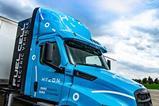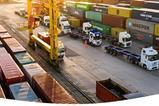DFDS has taken delivery of its first battery electric Volvo truck, one of an order for 125 as the logistics giant rolls out its green corridor of logistics operations.
“Green transport corridors across the Delta region and indeed across Europe are central to delivering on the European Green Deal. For green corridors to become a reality, we need innovative partnerships and strong commitments from industry as well as governments to invest in key infrastructure such as electric charging stations and hydrogen refuelling stations,” says Niklas Andersson, EVP Logistics in DFDS.
DFDS has pledged to become a net zero emitter by 2050. Targets will be met through investments in green solutions, including a promise to have 25% of its truck fleet powered by batteries by 2030. DFDS is also increasing solar and wind energy generation at their own facilities to provide the energy required for charging e-trucks. The e-truck is the first of 125 that DFDS has bought from Volvo Trucks and will be operational in the DFDS fleet by 2023. DFDS and Volvo Trucks launched a cooperative effort for sustainable road transport in 2021. Following an initial testing phase in Gothenburg, Sweden, the new Volvo FH Electric Truck was delivered in November during a ceremony in Ghent.
“The need to accelerate the transition to fossil-free transport is becoming increasingly clear. Therefore, I am very proud of the partnership we have with DFDS and this important step that they take today,” says Roger Alm, President Volvo Trucks.

DFDS is especially active in the Flemish-Dutch Delta region, running a multi-modal logistics solution from the Ghent port, with six ships per week sailing between Ghent and Gothenburg, taking 30,000 lane metres of freight from the road.
“At the same time, we need to bring down the price differentials between solutions running on green versus black energy in order to make decarbonisation commercially viable. DFDS is partnering with other companies and organisations to investigate and develop new solutions. And we are calling on policy makers to promote standardisation of infrastructure and invest in technologies that can lead to climate neutral transportation at a competitive price.” says Niklas Andersson.


















